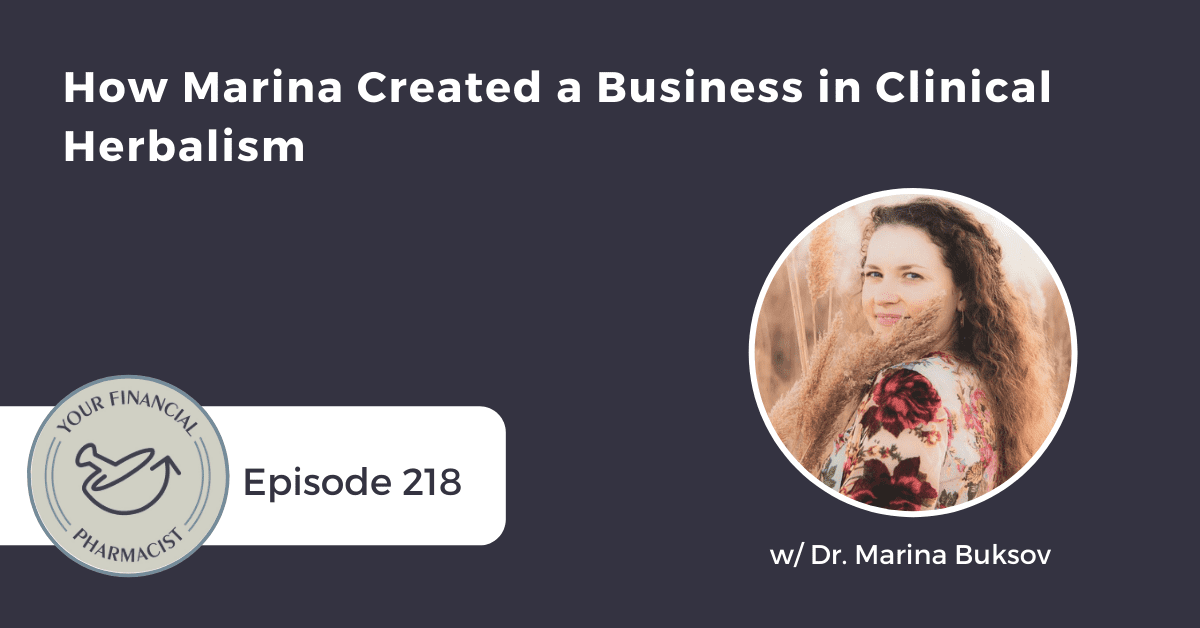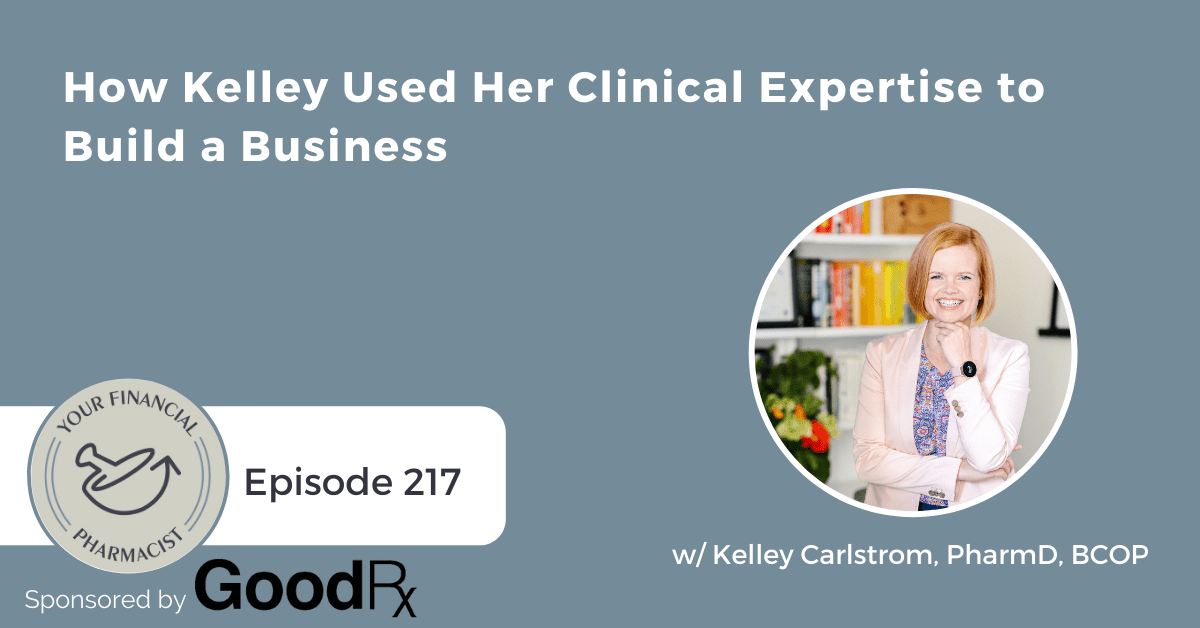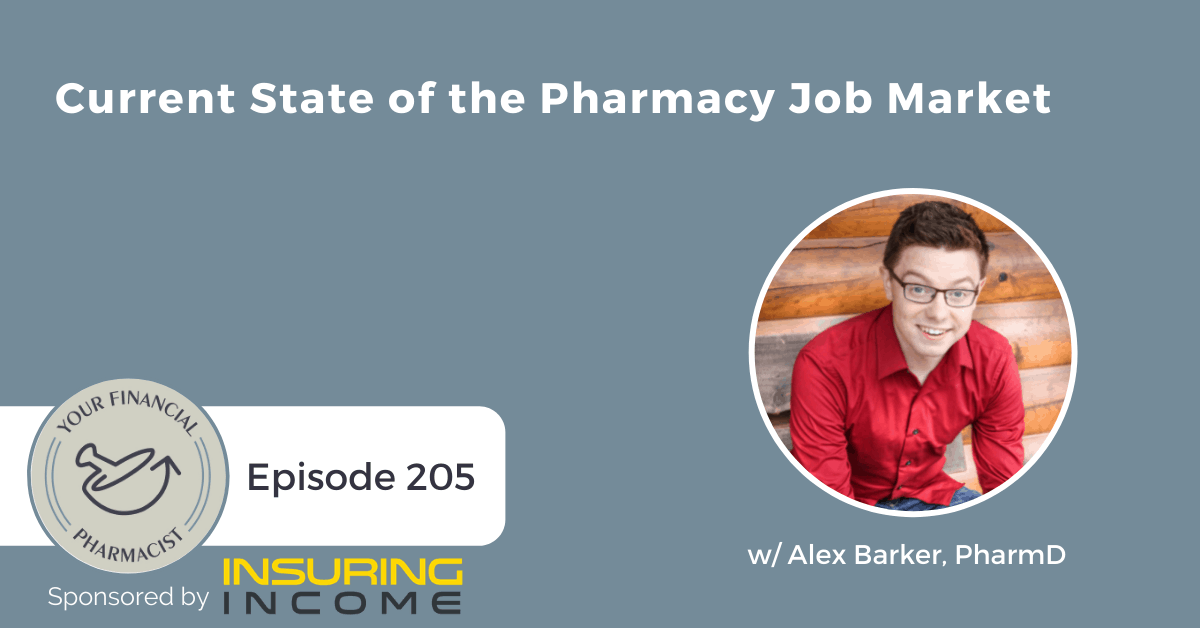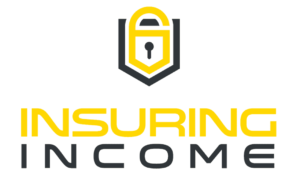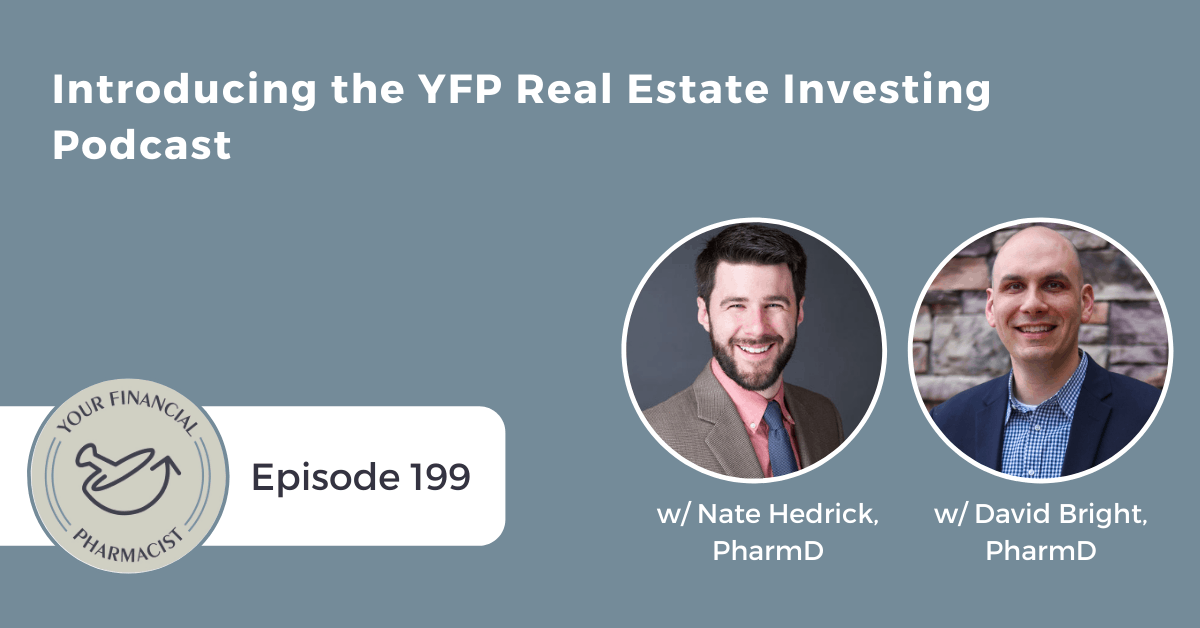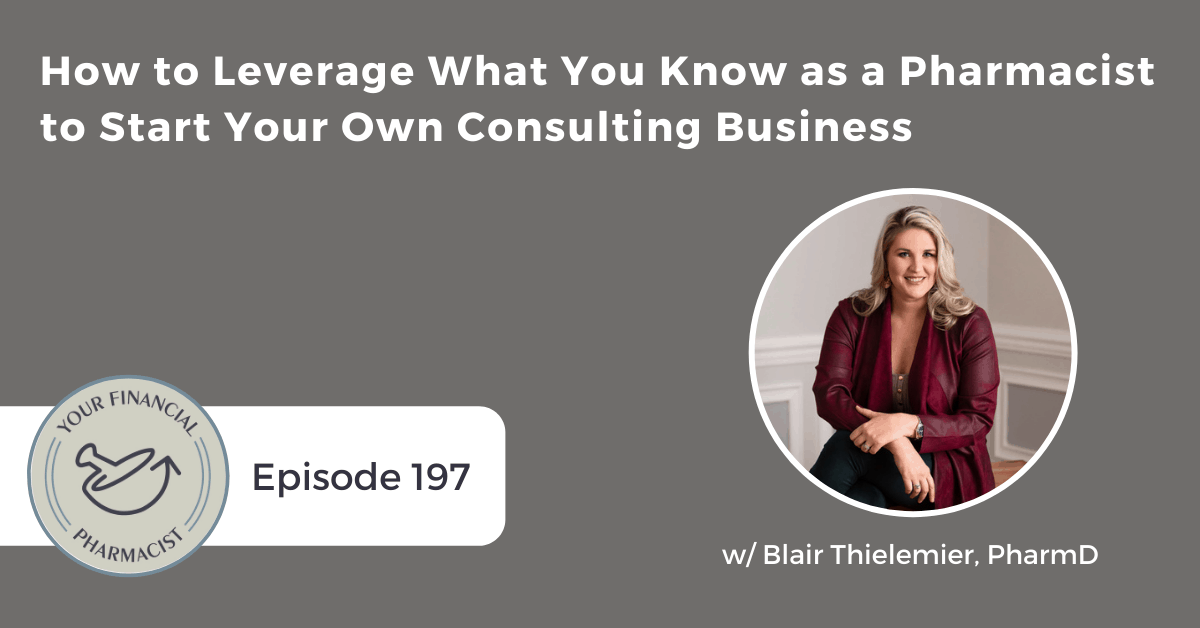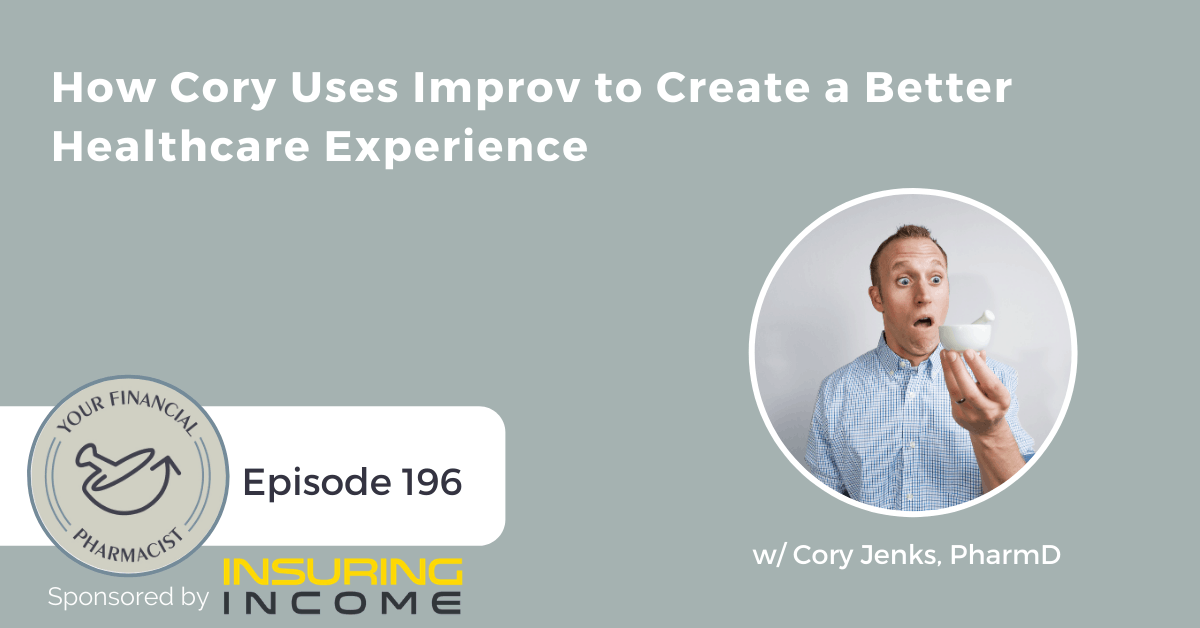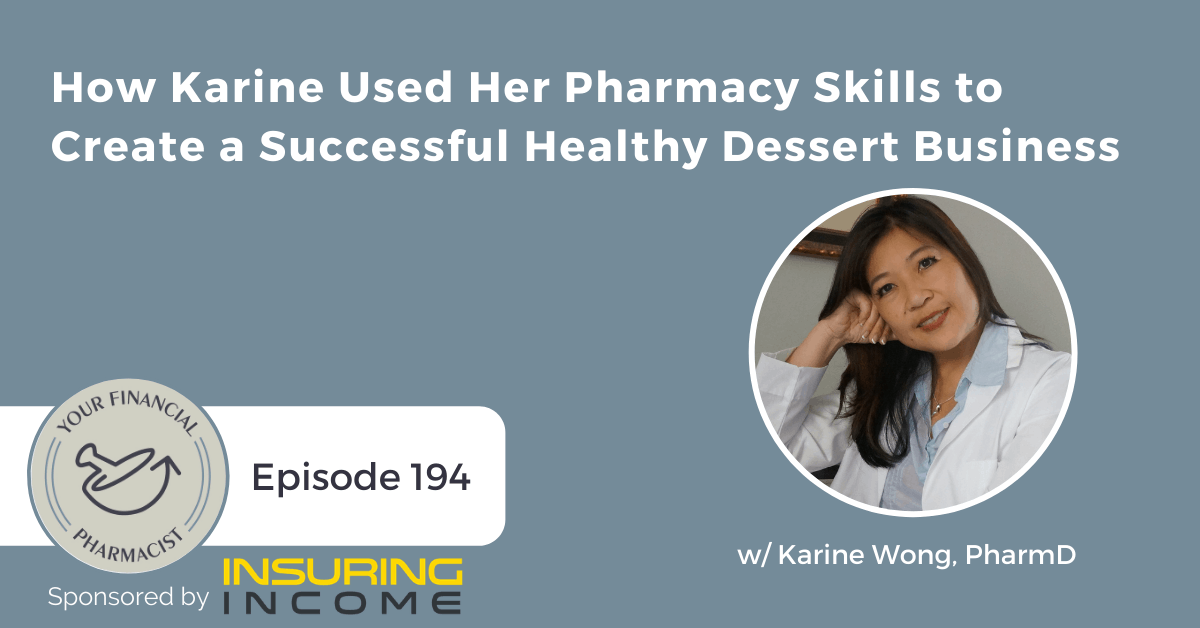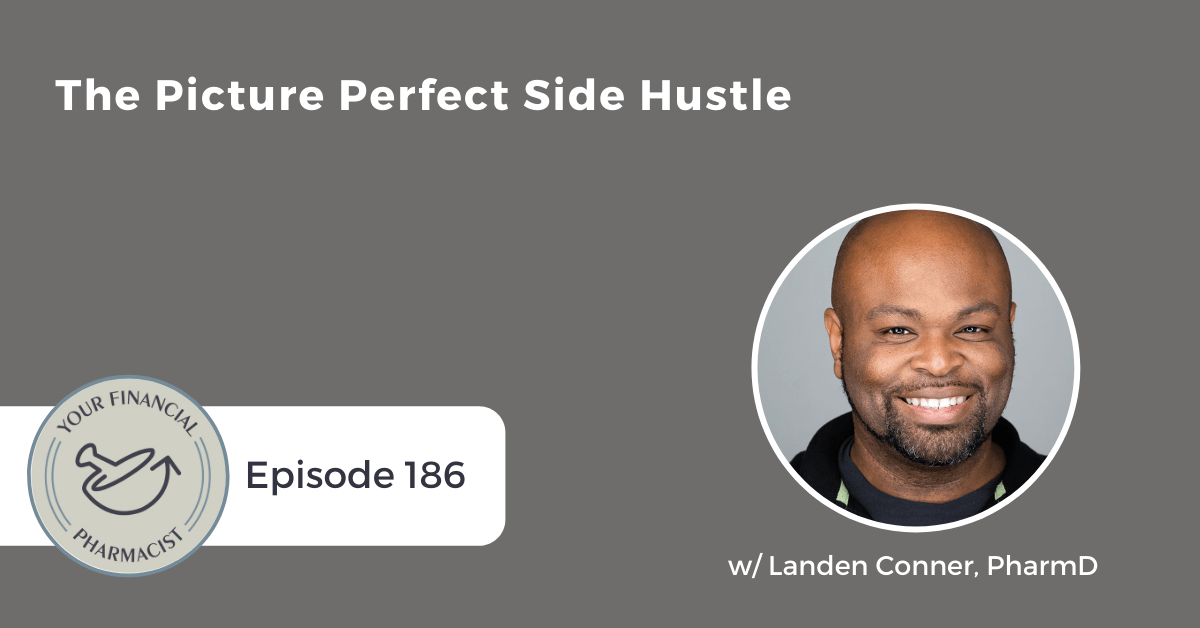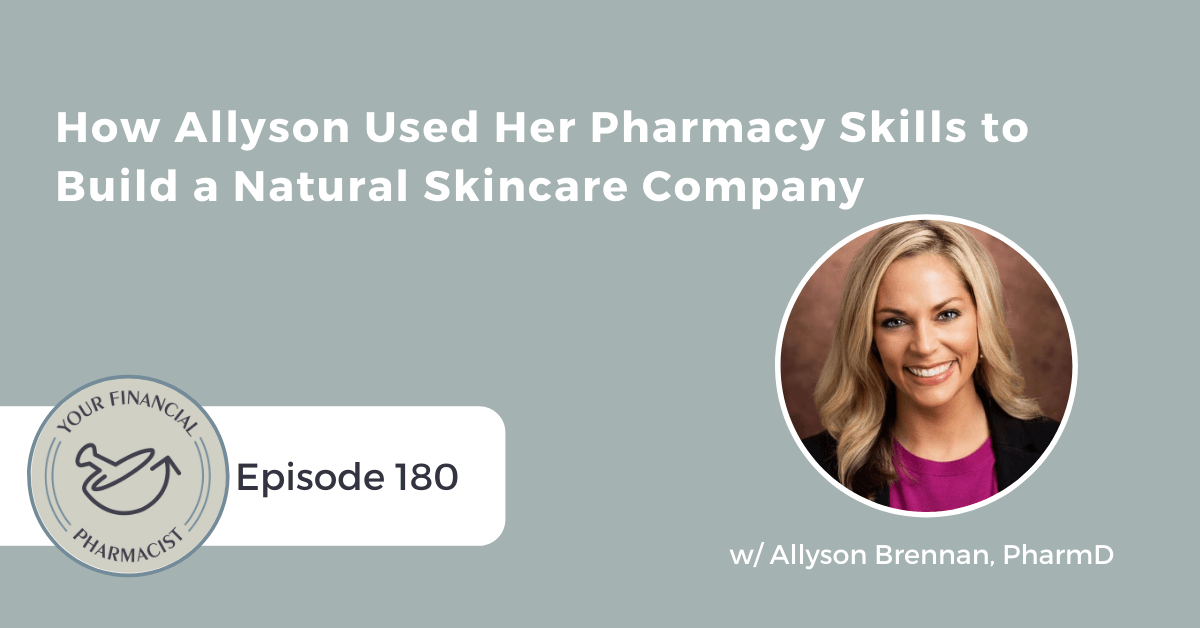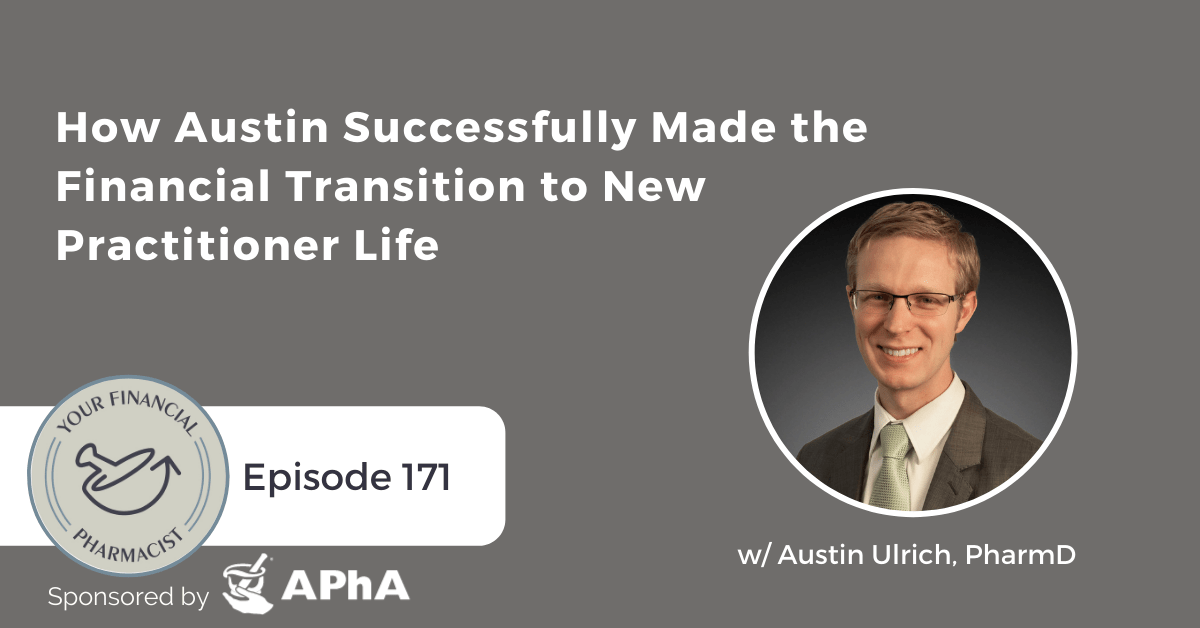How Marina Created a Business in Clinical Herbalism
Dr. Marina Buksov discusses her entrepreneurial journey in natural remedies and clinical herbalism.
About Today’s Guest
Dr. Marina Buksov is a registered Doctor of Pharmacy, Health Coach, Clinical Herbalist, and lifelong learner of the Healing Arts. She is the creator of Build Your Holistic Herbal Practice course mentoring other healthcare professionals in clinical herbal as well as business skills. She is also a functional medicine pharmacist as part of PharmToTable telehealth platform.
Marina also offers educational webinars with Radicle Herbs and is a wellness writer for Jejune Magazine. Marina uses her multidisciplinary background to educate patients about the least invasive and most natural methods for healing the spirit-body-mind. Her truly holistic approach helps women embody the best versions of themselves and lovingly celebrate the skin they’re in.
When she is not studying, Marina likes to dance, paint, and tinker with various concoctions (tea blends, meals, DIY projects). She lives with her husband, toddler, and two mischievous kitties in NYC.
Summary
Dr. Marina Buksov, a registered pharmacist, Health Coach, Clinical Herbalist, and lifelong learner of the Healing Arts, joins Tim Ulbrich to discuss her entrepreneurial journey. Marina reveals why she launched her brand and business, some lessons she learned along the way, and how her financial journey has intersected with her business goals.
Upon graduation from pharmacy school, Marina quickly realized that she didn’t feel truly passionate about any one particular area of pharmacy or traditional pharmacy career paths. After connecting with her mentor, she decided to explore alternative medicine. During this time, Marina started working in a Russian-style apothecary that specialized in herbs and supplements. Shortly after, Marina found her way into health coaching, incorporating her alternative medicine training and education from her retail pharmacy experience.
Marina advises other pharmacists who may experience that same sense of not belonging in the profession to explore a variety of areas of pharmacy, connect with mentors, and look for (or create) opportunities to find what and how you resonate with the pharmacy profession even as a practicing pharmacist. Along the way, mentors and coaches have played an integral part in Marina’s business, with financial planning and coaching guiding her ability to take risks with her business while also providing for her future.
Mentioned on the Show
- Take the Financial Fitness Test
- Dr. Marina Buksov: Holistic Nutritionist, Clinical Herbalist
- YFP Planning: Financial Planning for Pharmacists
- Connect with Marina Buksov on Facebook
- Connect with RawFork on Facebook
- Follow Marina Buksov on Instagram: @drmarinabuksov
- Follow Marina Buksov on TikTok: @drmarinabuksov
Episode Transcript
Tim Ulbrich: Marina, welcome to the show.
Marina Buksov: Hi. Thanks so much, Tim.
Tim Ulbrich: I am really excited to dig into your entrepreneurial journey and start us off by telling us about your journey into becoming a pharmacist.
Marina Buksov: Sure. So my parents are actually both dual majors, you could say, in biology and chemistry. And so they kind of inspired me to go down this road. I always loved chemistry as well. It kind of came naturally to me, I guess because my dad was also a chemistry teacher, even though I was learning chemistry in English and he had learned it in Russian. So we kind of didn’t speak the same language, even though it’s a science. I never really needed the help, but I guess the interest was there, much like it was for him. And so when I was choosing colleges, they kind of just brought up pharmacy and they said, “Hey, this seems like a really lucrative field of study right now that you can look into since you like chemistry and math.” So I kind of decided to try it out with the thinking that if I don’t like it, I could always get out of it. But if I don’t get in now, then I won’t have a Master’s degree in six years and the opportunity was really good. So I ended up applying to a couple of schools, and there weren’t that many pharmacy schools in my area. There were only two, so that narrowed down my choices. And I actually loved it in school. I loved learning about the body, and I learned about the biochemistry and about all the medications but also about the non-pharmacological areas, which is what I specialize in now. So I loved the whole process. So being in pharmacy school but again, when it came time to graduate, I found myself at a loss for where in pharmacy exactly I see myself fitting in. My focus was, again, kind of widespread and I liked a lot of different areas, but I couldn’t see myself doing any one thing. And I chose a variety of diverse rotation settings just to put myself in different experiences, but I still couldn’t see myself doing a fellowship or any other kind of advanced training program or in retail or in hospital. So I was kind of like thinking, what am I going to do after I graduate?
Tim Ulbrich: So you had a lot of interests heading into pharmacy, ultimately went that pathway for the reasons that you mentioned. And I’m not surprised you graduate, I can tell that you’re inherently a learner, you’re interested in lots of different things. You go through your rotations, you’ve got this doctorate degree, but you’re not necessarily feeling like you fit into any “traditional” mold, right, that we often think of of pharmacy graduates, which as I think we’re doing a better job of now in 2021, you know, realizing that there certainly are lots of opportunities. The PharmD is a pathway, in my opinion, to many different opportunities. And we’re going to get to yours here in a moment. But tell us then about the path after pharmacy school. What did you do? And did you find out and ultimately get into something that you found out you love? Or did it just affirm that, you know what, I’m not sure where I’m going to go with this path?
Marina Buksov: Yes, so I guess it’s just taking things step-by-step and one day at a time and seeing what opportunities arise and present themselves. So I did end up going to Midyear to interview for fellowships, but that’s when I realized that I don’t see myself doing neither a residency or a fellowship, even though it’s such a lucrative and competitive field that I feel like, you know, people go into it for maybe the merit of it or the prestige of it, maybe some people are really into it, but I was only seeing like the prestige side of it and I wasn’t really seeing how it was really something I’m personally passionate about, so I decided that wasn’t a good reason to apply. So I turned down the one offer that I had and I instead took another offer from a local pharmacy that was just a plain independent retail pharmacy that I had been working part-time as I was in pharmacy school and like learning the ropes there. So I accepted their position as a pharmacist. I figured this was like a safe step for me, a stepping stone, and from here, I could also do some learning on the side and figure out what I want to do next. And as it turns out, that pharmacy went out of business. Well, not really. But they were selling the pharmacy, so they said, ‘Oh, you know, there’s probably no point in us hiring you because we’re going to be selling the business so then we don’t know what the new owners are going to do.’ So basically, that offer fell through. And I found myself having no idea what to do. But I ended up just spending the summer after graduation and taking the test seeing on social media what opportunities are out there, and I ended up going to another pharmacy to kind of learn the system there and cover for someone. And it turned out a pharmacy next door was looking for a full-time pharmacist. So I happened to just go in there and drop off my resume, and they called me back and they said, “OK, we have a position for you.” And the interesting thing is it wasn’t a full-time in one position. It was kind of split between two stores. And one of the stores was in an area that I had said to myself that I would like to work in before, which is this area of Brooklyn that’s kind of a Russian population area called Brighton Beach next to the beach. And they do a lot of herbal medicine there because Russian medicine, much like Chinese, is very integrative in their approach. So their pharmacies are trained in both herbal medicine and pharmacological medicine and pharmaceutical medicine. So it kind of embodied both of those worlds, and I started my journey there.
Tim Ulbrich: So you’re working in a pharmacy that has more “traditional,” you know, what we think of of the pharmacy and dispensing medications, and then they have this more nontraditional — at least nontraditional in the sense of how we think of pharmacy practice in the U.S. So tell us more about that experience as you’re getting into more of the herbal experience and, you know, what did you learn through that? And how did this position and experience affect your path forward?
Marina Buksov: So it was pretty amazing to see how we have — we’re considered to be masters in our field, right, doctors, actually doctor of pharmacy in our six years of intense schooling, but we really know next to nothing on other types of medicine, anything “alternative” or holistic or complementary. All of that is kind of like if you’re lucky, you get an elective like I did. But otherwise, we don’t know too much. And even the over-the-counter medicines, we don’t go in depth about — again, unless you’re taking a self-care elective. It’s amazing that yes, we pack so much schooling and we come out with so much knowledge but also there’s so much more out there that we don’t know because we don’t know what we don’t know, right? If you just simply don’t know that it’s out there, you won’t even know that you can look for something else, right? So you’ll just rely on the “traditional” things that are conventional and available. So this was kind of like scratching the surface and exposing me to how other countries actually still utilize plant medicine and herbals and many more diverse over-the-counter products than we do. Basically, they’re very, very creative in how people are taking care of themselves from the home and they can go to a pharmacy and get a lot — a bunch of herbs or a bunch of herbal products or a mix between an herbal and a pharmaceutical that’s available without a prescription. And so there’s just so much more to know. And the pharmacists that are trained by, for example, Russian schools or any other kind of country that has this integrative approach, they know maybe not as in-depth as what we know pharmacologically, but they know a lot more about general self-care things that are, again, available to people without going to the doctor and without going to get a prescription. So that was really impressive, and I realized that I also want to know more.
Tim Ulbrich: So Marina, one of the things that I think of and I’ve seen this and heard it from entrepreneurs that have been on this show is that often, some experience that someone has leads to an interest or sparks an idea and then that ultimately will set them off on the path to start something, could be a business, could be a nonproft, could be a side hustle, whatever you want to call it. And before we get into your business, what you’re doing, what you’re working on, I don’t want to gloss over that there is a big jump from experience to idea to actually starting a business. So talk us through that a little bit more in terms of you’re working in this pharmacy, you’re getting this experience, it’s affirming the interests that you have, you’re a learner and you’re absorbing more information. What is the idea or the opportunity that you see that ultimately leads to you starting your business?
Marina Buksov: I mean, I think there were several big factors that were going on, one of which was my personal health journey that has been going on too during this time. And the interesting thing is that now, I — looking back at it — attribute it to psychosomatic things that were happening in my body and my mind and spirit, perhaps, because as I was graduating pharmacy school, I remember described my confusion and not feeling like I fit in anywhere, not knowing if this is actually the path that I should be on, kind of questioning all of that. And I called this my quarter-life crisis that happened because as I chose, you know, the retail position and the retail, as you know, you’re kind of behind the counter and, you know, the most pleasurable activity there was coming out and counseling the patients. But because of the fast pace, even in independent settings, often unless they had questions, counseling wouldn’t really happen.
Tim Ulbrich: Yep.
Marina Buksov: So that was my biggest joy, but unfortunately, I found myself mostly just filling prescriptions and checking things and billing insurances and calling doctors and calling insurances and being behind the counter and not really having the patient-to-patient interaction, which is what my favorite part was. And I started having different kinds of health issues arise from finishing pharmacy school and all through my first years of practice where I had like a worsening in my digestive tract issues that I had growing up, IBS type of things. I was also diagnosed with H. pylori. I had to take a lot of antibiotics. Then I had this obscure dacryostenosis happen in my eyes, which is when your tear ducts basically become more narrow. And so my eyes starting getting chronically inflamed. And at that point, I didn’t even want to come out and see anyone from behind the counter because I felt that I looked horrible with my inflamed eyes. And to top everything off, I also started having PCOS type of symptoms and was diagnosed with it and had lots of acne, which I never had growing up. So it was adult-onset acne and weight gain. And so all of these issues started cropping up when I, again, now, looking back at it, see it tied more to my life purpose and my mission wasn’t really being carried out. And so my health was suffering because of that.
Tim Ulbrich: OK, so Marina, you identify an opportunity to help train others, make other folks aware of some of these practices that, again, could supplement more what we think of traditional medicine. So what does that lead to in terms of your business, your services, what you’re offering, who that’s intended for, and really, what does that look like to solve the problem of which you just described, which is to really help fill what is potentially a gap out there and unawareness and lack of education?
Marina Buksov: Yeah, well, it took some time to distill that exact thought in my entrepreneurial journey. And as I like to say, the entrepreneurial journey is kind of like a forever commitment because you’re always growing. And it’s very much tied to professional growth, the business growth, and your personal growth where your business is a reflection of you and what you’re going through internally. And if you can master your own self, you can master having a business. As I was going along and working in mostly the retail setting, I realized this gap existed, right? So the first step was realizing that there is something I don’t know. So the first thing I need to do is educate myself on that. And then I could kind of draw some other conclusions or learn how to run a business with that perhaps or how to incorporate that into my practice that I already have. So first thing I did was I spoke to my complementary and alternative elective professor, and I asked her what she thinks I should do, and I shared with her how I feel like I don’t fit in and I really did have an interest in that elective. So she suggested I reach out to another person who was a graduate right before me. So when I spoke to her, she suggested that I go into health coaching. So my first program out of college was immediately enrolling in a health coaching program. So after that, I underwent a series of other programs where I learned everything from functional nutrition to eventually clinical herbalism. So how to work with plants and phytochemicals in a way to support the human body. Both nutritionally and medicinally, plants have a huge role in this. And they’re really the basis of both traditional pharmacy and naturopathy and even functional medicine or any supplement that you take out there, they have a basis of some kind of plant behind that. So the minerals and vitamins we extract or the active constituents probably have a root in a plant somewhere.
Tim Ulbrich: Yeah, and I think, you know, you’re taking me back, Marina, to sometime in pharmacy school. And you’re right. There’s just a lot of connection back to the herbal aspect. And you’re spot-on that traditional PharmD curricula doesn’t necessarily provide much information — really, if at all sometimes, depending on the curriculum — that would allow folks to think about some of the application of this clinically or how some patients might be interested in approaching this. So again, you’ve identified a need, right? We’ve just talked about that. You mentioned about this very much being a journey, which I would agree with. And you’ve sought out additional training, so you provided some additional education to help increase your skills, which then takes us to the point where OK, you’ve got — you’ve obviously got your PharmD background, you’ve got some additional training, you’ve identified an opportunity to serve a group that perhaps isn’t being served to the full potential. So if I come to you, Marina, and I’m interested in this area of practice, whether I’m a pharmacist or not, like what are you offering? What is the product? What is the service?
Marina Buksov: There were a couple of iterations in my offerings. But it has evolved to me seeing clients in a functional medicine capacity as part of a team on a telehealth platform. So I realized that that would probably be the best use of my time in working with private clients whereas the majority of my business focus is really around educating and that knowledge gap to other providers and healthcare practitioners, especially pharmacists, that are wanting to learn about employing herbal medicine, whether they’re a pharmacy owner that wants to specialize and offer this to their patients or if there’s any other way that they would like to incorporate it as a private consultant like I did for many years or working with supplement companies as a consultant. I mean, there’s a myriad of ways. And that’s actually part of what we do in the program besides the didactic knowledge and homework that I give and accountability that I provide, I also train on the kind of business end side of things and how to actually implement some of these things into your work or business so that you have a successful vocation at the end of it.
Tim Ulbrich: Gotcha. So there’s both the patient side of it; you mentioned seeing clients one-on-one, and then more of the focus of what you’re doing on the business is training and educating others both on their clinical understanding but also some of the business aspects involved with this. So if we continue on the journey, I mentioned before often we have an experience that can spark an idea or lead to an interest that then takes us on our own entrepreneur journey to start something. Once you start something, obviously there’s then the task of OK, do folks know about what I’m doing? And how am I marketing this? And how am I making people aware of this? So tell us about your current strategies. I looked at your website; you’ve got a lot of great educational information, you’ve got a podcast. Like what is your strategy in terms of standing out so that other folks can become aware of who you are, your brand, the services that you offer, and ultimately engage in those and benefit from them.
Marina Buksov: This is definitely something that after I got the clinical knowledge side of things down — and again, I’m a person like many of us, especially pharmacists, we feel like we never know enough, so we always want more and more and more courses and all of this stuff, which I’m definitely guilty of. But eventually, I said, OK, I know enough to start helping people. So now I have to, again, focus on how am I presenting myself? How are people finding me? How can I serve? You know, because I am now capable of serving in the way that I want to serve. But how can I do that without any clients? So I had to also teach myself that and I have to say that it was a very hard and rocky journey to teach myself, so I really recommend investing in a coach that will show you the ropes, which is what I eventually had to do. I actually worked with several business coaches and was part of like Business Masterminds and again, those are great for accountability and support. And I’m trying to really cut that learning curve for people where they can just go to one program that will teach them a really, really good foundation and basis for everything that they would need in terms of botanical medicine, which is again, the backbone of every alternative, holistic practice in some way or form. And so people can get the clinical side of things, get a really good foundation and backbone, and start to dip their feet into the marketing and the business side of things immediately and finding themselves a niche and whatever else will help them on their particular implementation plan because for me, it took me a really long time. You know, I’ve been working slowly, slowly to build my business for about seven years now. And this year was the first year that I really pivoted and decided who am I going to serve and was really clear on that and came out with my program, which I mentioned, that I’m now running. So this all kind of solidified earlier this year.
Tim Ulbrich: And I hope our listeners, especially those that have an idea or maybe they’re at the beginning of their journey or maybe even feeling frustrated with, man, this is just not taking off as quickly as I can, just hearing that timeframe, right? Seven years. You know, I think back to the journey of YFP, coming up on seven years. And there is always something new that is to be learned. And I would encourage folks to check out your website, Marina. We’ll link to that in the show notes, DrMarinaBuksov.com, because I think you’ve done a really nice job of what I think is an important recipe to taking people along the journey from interest to actually being able to engage with those folks and then offer them a product or a service that is of value and hopefully is mutually beneficial between you and that individual. And you know, when you look on your website, you’ve got obviously valuable educational content in terms of interview that you do on the podcast and other resources, but you also have done a nice job with building lead generation techniques and guides and some other things that help you to capture those leads and then you have the ability to follow up with them and convert traffic into conversations that you can have and engage with that community. And so lead with value and then find a way to be able to capture that audience and then you can have that two-way conversation to see whether or not your services may be a good fit. Marina, I want to go back to something you mentioned a little bit earlier. And you mentioned it quickly, but it’s a really important point. And that is that folks that are going on this entrepreneurial journey, no matter where they are in that journey, I do think that certainly includes not only the professional side but a fair amount of personal development. And I believe from my experiences that often, engaging and leaning into the business can really bring out some of the best strengths that someone may have that maybe they weren’t even fully aware of what those strengths were, but it also can expose some weaknesses, opportunities for development, whatever you want to call it, that maybe otherwise weren’t exposed because of all the different hats that you have to wear as you’re trying to get a business off and running. So Marina, for your journey, what are an area or two that you think of by going through this journey and the work that you’ve done in starting this business, it’s really brought out or firmed some of the strengths that you have and then other side of the equation, maybe has exposed some opportunities where you even need to surround yourself with others’ support or even develop yourself a little bit further.
Marina Buksov: That’s a great question. I think really, this journey does expose you with the opportunities for growth, like you said, by exposing you to some of your not-so-favorite qualities or maybe even your worst qualities will come to life when you start to run a business because like I said, often we see the business as a reflection of us because it’s so personal to us. It’s related to our vocation and our personal mission, what we’re trying to be in the world. So sometimes, when we’re faced with not seeing success right away or as soon as we like or the level of success that we like, however you would like to measure that but most people measure it with fame or money or visibility or some kind of feedback, right, from the real world, maybe really good testimonials is another one. So whatever success is for you, it’s important to define it and to also be able to separate you from your business but also learn when it is a mirror and what you can learn from it. So you know, just because your business may not take off as soon as you’d like, like we said, seven years for us, or something is just not going your way or you’re experiencing some sort of setback, just know that it could be a “temporary failure” or think of it only as a lesson because you really can only either win or learn. That’s how I approach things nowadays. And so if something doesn’t take off immediately or doesn’t give you a reward on your investment right away, it doesn’t mean that it wasn’t valuable. It’s a step that was vital for you to not repeat that in the future or to learn a different strategy that will work better or some other important lesson for you to, again, learn from. And especially if you don’t have a business background, you should expect some sort of challenges or setbacks in business your first rodeo because you know, you could be a great pharmacist and know everything there is about pharmacy, but that doesn’t mean that you’ll know immediately how to run a business and how to have that proper mindset to run a business. So for me, it was a lot of coaching that helped me and also seeing that other people on the same journey as entrepreneurs are also experiencing similar challenges and setbacks. So viewing that as a normal part of the growth process instead of seeing it as a failure is my best advice. And ultimately, I realized that even if I do experience setbacks in my business, it’s still worth it for me to eventually have the opportunity to succeed by showing my mission and getting more recognition about my mission. And inspiring others to pursue their missions with my story is worth it to me, despite all of the setbacks that it has potentially.
Tim Ulbrich: Absolutely. And that’s what I encourage folks: Share your story. You don’t know who’s listening, who may be affirmed by that, who might have an idea that it helps stimulate that forward, a student who’s feeling frustrated and unsure of where to go with their career path and just hearing about alternative ideas. I think so much value in that. And Marina, loved what you shared to connect that with the value for you of a coach. And I think that sometimes on this journey, like not only — especially for folks that are working full-time and they’re starting a business or an idea, you know, there’s that excitement, there’s that energy, but it also can be a lonely place and you’re putting in a lot of time. And having a coach, having a community, having a mastermind, having folks around you that you can bounce ideas off of and get support from, is just really important for the accountability but also be able to talk out loud as I think so much of this, we can live in our own thoughts as we’re trying to build the business. And shoutout here as I think about for YFP, my partner at YFP, Tim Baker, you know, I have the opportunity to sit down on a regular basis and we can share wins, we can share frustrations, but just having those conversations I think is so, so valuable. Marina, I’m going to ask you about the connection between the personal financial plan and what you’re doing on the business side and vice versa. And where I’m going with this is that I am a firm believer that a good, healthy business is often built and built confidently when you can build that upon having a strong personal financial foundation because you’re not necessarily worried about, ‘What about this? What about that?’ It doesn’t necessarily mean you have all of your financial goals achieved, but you’ve got a good foundation of which you can work from so you’re not constantly worried about that as you approach the business with confidence. And vice versa, often our business activities are able to help support our personal financial goals, whatever that may be for individuals that are listening. So tell us a little bit about for you, how the business and your personal plan have really worked alongside and have ultimately fed into one another.
Marina Buksov: I have to admit that I was a little bit floundering in this area before with actually tracking things. Like you were saying, it’s really important to bounce ideas and to talk about what’s happening, what are the wins, what are the challenges, and to actually put that into numbers and see in that way how your business is actually doing because numbers don’t lie, as they say. So that part of it, actually tracking and putting things down as data and analyzing it, you know, you can just remove some of the stigma that’s attached to OK, is this number a win or a fail? And actually, just view it as a statistic that is showing you OK, what can you improve on based on these numbers? You know, which area needs improvement? Which area is doing well? So that way, you can focus your resources and your time and energy on improving the things that aren’t doing well and doubling down on the things that are. But unless you track it and use numbers, you really won’t know. And so same thing with my business. You know, for a long time, I was reluctant to even put down numbers that are coming in from clients and balancing the checkbook and all of those kind of business tasks because it’s like a hassle because it’s another thing for you to do, but I realized that it’s very important and it actually gives you the clarity and the confidence with what needs to be done next because another thing that was a challenge for me is to learn how to prioritize. And so when you see the numbers in front of you, you see what needs to be done first. You know, what is an area that really needs your help and attention right now? And what scenario that can wait? And often, you know, I spread myself thin. I’m sure many other people do, trying to do all the things. But really, we need a structured guide so that you mentioned before, not to burn yourself out by all the business activities and to really have this focused plan of intention and a plan of action, which can really be informed by the numbers. So when earlier this year, you know, I was investing in coaching programs all these past years and really wanted to take my business to the next level and wanting to leave my job full-time, that’s when we started to — actually last year at this time, so about a year ago, my husband and I decided to look into a financial planner because we wanted to know, you know, where do we stand financially personally? And where can we be confident in making a certain buffer for ourselves so that we can take certain risks with our business? I think that’s really important to have a plan and to expect some setbacks. Nothing is going to be smooth sailing. You know, the past few years taught me that. But I decided it was really important to look at the numbers and to create a buffer, which we were comfortable for a certain period of time so that we give ourselves that safety zone from which the business could grow. And again, that’s always a risk. Is the business is going to take off exactly per our plan, our projections, or not? So shameless plug to YFP: I was working with YFP, and I found that I really didn’t know much because this is not my area of interest, right? Accounting and counting numbers, I am more into health and wellness and getting results for my clients. I would like to dedicate my time for those kind of things. But living in the real world, you do have to think about personal finances and business finances and retirement and putting away money for more expenses than you even are expecting because —
Tim Ulbrich: Boring, right?
Marina Buksov: Yeah, a lot of us live paycheck-to-paycheck, and we don’t realize, you know, we need to set aside money for this or we need to plan an estate or we need to maybe save for education for our kids or if you are a homeowner, there’s many hidden expenses that pop up that you don’t expect. So we decided it was time for us to kind of get a realistic perspective and reality check so that we can be more confident in the business side of things. And so I highly recommend working with a financial advisor that has your best interests at heart and doesn’t just want to sell you things with commission attached.
Tim Ulbrich: Yeah, and I think for Marina, you mentioned some of the value that can come from the technical side, right, of the financial plan. I know for Jess and I and our journey, which I think is something that others may find value in, is sometimes when you’re in the weeds of your own financial plan, it’s really hard to see outward, right? And having somebody as a third party, you know, thinking of spouses or couples that might be working with a planner specifically, where you can have somebody ask really good questions that get you thinking, that get you talking, that get you really evaluating like, what is the true risk on this scale, right? And I think that while I don’t want to categorize all pharmacists as being risk-averse, I think sometimes we view financial decisions on that end — and I’m certainly not promoting that we go out and make crazy financial decisions, right. We’ve got to take care of our future self. But we’ve also got to live a rich life today. And part of what I’m hearing through this interview, Marina, for you is living a rich life was pursuing this passion that not only was only important to your physical and emotional health but also what you saw as an opportunity to bring this information to other healthcare practitioners and ultimately the patients that they serve to be able to have an impact. And that’s an investment worth making, right, in being able to see that through, whether it’s a coach, whether it’s a financial planner, and certainly all the other investments you’ve made in getting the business up. Marina, I’m thinking back to your journey where you mentioned, ‘Hey, I’m graduating pharmacy school. Yeah, it’s been an interesting ride, but I don’t really feel like I fit, right? I don’t fit in a traditional mode of fellowship or of residencies or, you know, community pharmacy or inpatient practice. And so I suspect we have a lot of other people that might be feeling that, whether it’s students that are maybe questioning was this the right decision or I’m not sure where I’m going to go or practicing pharmacists that might feel the pull to explore another area of pharmacy and how their pharmacy degree could be used but they just don’t know where to go, who to talk to, where to start. What advice would you have for folks that are out there that are listening and feeling like, I’m just not sure I really fit in this whole pharmacy thing. Like where do I go? What do I do?
Marina Buksov: Yeah, so I think the best thing to do is really dip your toes, just like I was talking about how I selected a diverse variety of rotation sites for myself in APs and FPs. As much as possible, I tried to diversify. I worked in insurances, worked in different settings, pharmaceutical industry, basically everything was super different. And that taught me, actually, what I liked and what I didn’t like because just getting a glimpse into a setting and how it would be like to work there and the day-to-day, how to assess what they’re doing on their back end and how you feel about that and then giving you a sense of if you can climb the ladder in that space, if it’s more corporate or not. So you can kind of picture yourself in those spaces and see do you feel good there? And does this agree with your inner wiring or your ethics? Because for me, I found that I really wanted to make an impact. That was important to me to use my skills in a way that was impactful and that I felt I was creating good in the world. And I saw that as targeting the low-hanging fruit, you know, how we can improve on a large scale our public health and self-care by education and by self-care. That’s really my mission, what it really boils down to. And the other settings for me didn’t provide that level of impact. You know, there was some personal gratification or again that prestige aspect in some settings, but I was not on the same mission as those settings and what they were doing. So I didn’t feel like I fit in there. On the other hand of the spectrum, even if you don’t get to go on a variety of rotation sites, you can find your own opportunities. So actually, I had a bunch of students reach out to me. And I might be a preceptor someday soon.
Tim Ulbrich: Oh, fun.
Marina Buksov: And then besides — nowadays, yeah, the opportunities are crazy because we’re in a virtual world. But you can also just reach out locally. So when I was considering going to herb school — actually, before I even knew there was a thing because that’s another missing knowledge gap because I didn’t even know there was such a thing — so before I even knew somebody had recommended that I check out an herb shop as a place where I could practice alternative pharmacy. So I went to a local herb shop and asked the owner to give me an internship, which he did. So there is plenty of ways you can create your own opportunity and learn from the experience and empirically applying yourself there. It’s going to teach you so much more than what you can read in a blog or a book. So that’s really what I recommend. And when I was in the shop, that’s when I decided to go to this school and get a more formal education because I did see myself aligning with that and being interested to learn more. So I think exposing yourself to experiencing is the best teacher. So whatever way you can do that locally or virtually nowadays and get somebody to mentor you or again, if you’re able to invest in a coach if let’s say you’re not a student but you’re a pharmacist, it is worth it to have some level of guidance or mentorship.
Tim Ulbrich: Yeah, great advice and wisdom, Marina. And back to a comment that you made earlier. You either win or you learned along the way, correct? And I think of maybe students who have some of those opportunities to choose rotations and get out there and network. But for pharmacists that are out there, you know, don’t let that be a hindrance. You know, reach out to folks like Marina. Reach out to folks in other nontraditional areas. You know, have several conversations. People are very willing typically to meet. And I think not only will that networking be really valuable, but I think it will also stimulate hopefully some ideas and conversations and lead to other connections that will affirm areas of interest and hopefully generate some ideas as well. Marina, I really appreciate you taking the time to share your story. I’m looking forward to following your journey in the years ahead. And I have a feeling you have inspired folks that are listening and perhaps in their own journey, whether they may be on moving forward with some of the ideas that they have of their own. So Marina, as we wrap up, where can listeners go to learn more about you and the work that you’re doing and to connect with you?
Marina Buksov: Yes, so the website you mentioned, it’s DrMarinaBuksov.com. And it has all the links to my social media. But I am on Facebook and Instagram and even TikTok nowadays. So you could reach me everywhere at @DrMarinaBuksov. And you can also search by my business name, which is Raw Fork.
Tim Ulbrich: Great. We’ll link to those in the show notes. And again, Marina, thank you so much for your time.
Marina Buksov: Thank you so much, Tim.
Current Student Loan Refinance Offers
[wptb id="15454" not found ]Recent Posts
[pt_view id=”f651872qnv”]

